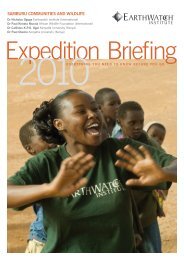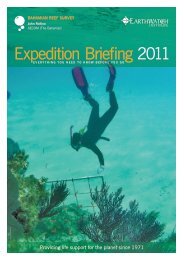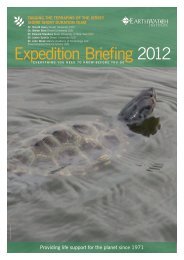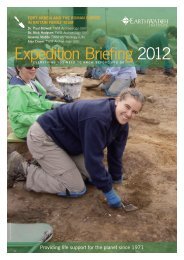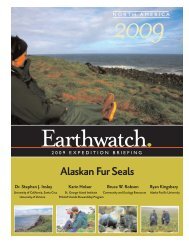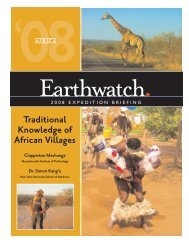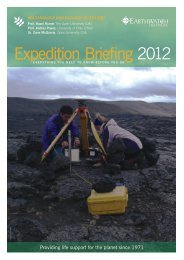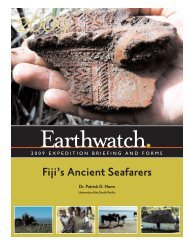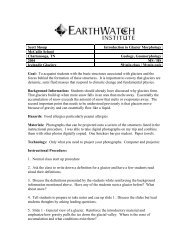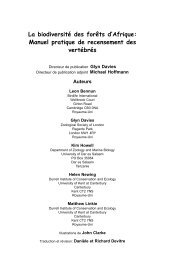Climate and Landscape Change in Borneo's Rainforest 2013
Climate and Landscape Change in Borneo's Rainforest 2013
Climate and Landscape Change in Borneo's Rainforest 2013
You also want an ePaper? Increase the reach of your titles
YUMPU automatically turns print PDFs into web optimized ePapers that Google loves.
Terra<strong>in</strong><br />
Animals/Insects<br />
Plants<br />
<strong>Climate</strong>/Weather<br />
In/Near Water<br />
The terra<strong>in</strong> at field sites can be rough or uneven <strong>and</strong> is mostly covered dense forest <strong>and</strong><br />
fallen trees; it is likely to be very slippery due to regular ra<strong>in</strong>fall. There is risk of <strong>in</strong>jury due<br />
to fall<strong>in</strong>g over fallen trees, slipp<strong>in</strong>g, or tripp<strong>in</strong>g on uneven ground. You will be briefed<br />
on risks of walk<strong>in</strong>g over rough terra<strong>in</strong>. You must wear hik<strong>in</strong>g boots. Be aware of your<br />
surround<strong>in</strong>gs <strong>and</strong> watch where you step at all times when <strong>in</strong> the forest. Field sites will<br />
be prepared with cleared access as much as is possible. Terra<strong>in</strong> at the field camps can<br />
also be uneven <strong>and</strong> very slippery. Always wear appropriate footwear <strong>and</strong> use a torch<br />
when walk<strong>in</strong>g around at night.<br />
Sabah is home to a number of potentially dangerous animals. There is risk of attack<br />
by large mammals (e.g., elephant, wild boar), as well as risk from venomous snakes,<br />
scorpions, <strong>and</strong> other st<strong>in</strong>g<strong>in</strong>g <strong>and</strong> bit<strong>in</strong>g <strong>in</strong>vertebrates (e.g., centipedes, wasps, hornets,<br />
mosquitoes, s<strong>and</strong> flies, leeches, <strong>and</strong> ticks), many of which carry the risk of disease<br />
transmission (e.g., malaria, dengue fever). Wear long-sleeved, lightweight cloth<strong>in</strong>g,<br />
use <strong>in</strong>sect repellent with DEET, <strong>and</strong> use mosquito nets when appropriate to protect<br />
from <strong>in</strong>sects. You will be briefed on appropriate cautions <strong>in</strong> the forest <strong>and</strong> on how to<br />
avoid <strong>in</strong>sects <strong>and</strong> other <strong>in</strong>vertebrates (e.g., by shak<strong>in</strong>g out shoes <strong>in</strong> the morn<strong>in</strong>g <strong>and</strong><br />
self-<strong>in</strong>spect<strong>in</strong>g on a daily basis).You’ll be provided with anti-leech socks, <strong>and</strong> will be<br />
made aware of the risks from dangerous animals <strong>and</strong> disease <strong>and</strong> the need to restrict<br />
entrance to field sites if dangerous animals (e.g., elephants) are thought to be present.<br />
Staff members are tra<strong>in</strong>ed <strong>in</strong> treat<strong>in</strong>g snakebites <strong>and</strong> will tra<strong>in</strong> participants on how to<br />
avoid snakes. They will carry a medical kit at all times <strong>in</strong> the field <strong>and</strong> are tra<strong>in</strong>ed to<br />
recognize <strong>and</strong> treat anaphylaxis. Those with allergies should br<strong>in</strong>g along medications<br />
(antihistam<strong>in</strong>es, at least two EpiPens, etc.) as appropriate to relieve symptoms. Make<br />
any allergies known to Earthwatch scientists <strong>and</strong> <strong>in</strong>form staff of your treatment needs<br />
<strong>and</strong> location of any medication. Also note allergies on your Earthwatch Health Form.<br />
Many plants have irritat<strong>in</strong>g sap, thorns, sp<strong>in</strong>es, or large <strong>and</strong> heavy fruits. You will be<br />
briefed on potentially dangerous plants, how to recognize them, <strong>and</strong> the hazards posed<br />
by fall<strong>in</strong>g fruits, branches, <strong>and</strong> trees. Fieldwork stops dur<strong>in</strong>g w<strong>in</strong>dy conditions or heavy<br />
ra<strong>in</strong> when fruit, branch, <strong>and</strong> tree falls are more likely to occur.<br />
The climate <strong>in</strong> Sabah is moderate for a tropical country, but the hot, humid climate <strong>in</strong><br />
comb<strong>in</strong>ation with strenuous physical work can cause physical exhaustion, dehydration,<br />
heatstroke, sunstroke, <strong>and</strong> sunburn. Acclimate slowly, carry <strong>and</strong> dr<strong>in</strong>k sufficient water<br />
dur<strong>in</strong>g fieldwork, <strong>and</strong> take precautions to avoid sun exposure: wear long-sleeved,<br />
lightweight cloth<strong>in</strong>g <strong>and</strong> a hat <strong>and</strong> apply high-factor sunscreen. If you beg<strong>in</strong> to feel<br />
hot or ill, alert the Earthwatch scientists or project staff, cease strenuous activity, cool<br />
down <strong>in</strong> the shade, <strong>and</strong> receive first aid if necessary. Intense ra<strong>in</strong>storms are common;<br />
fieldwork <strong>and</strong> travel to field sites will stop dur<strong>in</strong>g extreme weather conditions. If you<br />
are sensitive to heat or humidity, you will f<strong>in</strong>d participation <strong>in</strong> this expedition difficult or<br />
impossible. Many common prescriptions, <strong>in</strong>clud<strong>in</strong>g malaria prophylaxis, can <strong>in</strong>crease<br />
your sensitivity to sun <strong>and</strong> heat.<br />
Because of the high humidity, persons us<strong>in</strong>g a hear<strong>in</strong>g aid device may f<strong>in</strong>d it doesn’t<br />
work properly. You should consider purchas<strong>in</strong>g a hear<strong>in</strong>g aid dehumidifier.<br />
The team may need to wade through rivers or streams dur<strong>in</strong>g fieldwork. Earthwatch<br />
scientists are tra<strong>in</strong>ed <strong>in</strong> river cross<strong>in</strong>g protocols, <strong>and</strong> will verify that participants<br />
can swim. Field staff will monitor weather conditions constantly <strong>and</strong> will not attempt<br />
cross<strong>in</strong>gs or will modify research locations if there is a likelihood of high water. The team<br />
will not cross water that is deeper than below the knee of the smallest person on the<br />
team. Always wear shoes to cross rivers <strong>and</strong> streams; we will let you know when this<br />
may occur so that you can pack s<strong>and</strong>als if necessary.<br />
<strong>Climate</strong> <strong>and</strong> L<strong>and</strong>scape <strong>Change</strong> <strong>in</strong> Borneo’s Ra<strong>in</strong>forest <strong>2013</strong><br />
21



